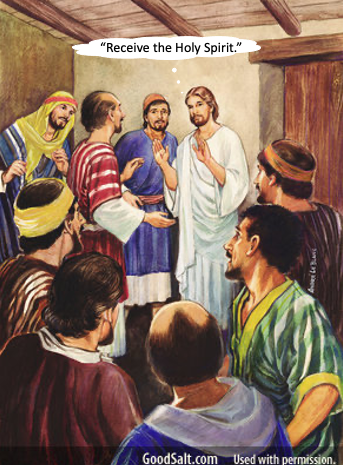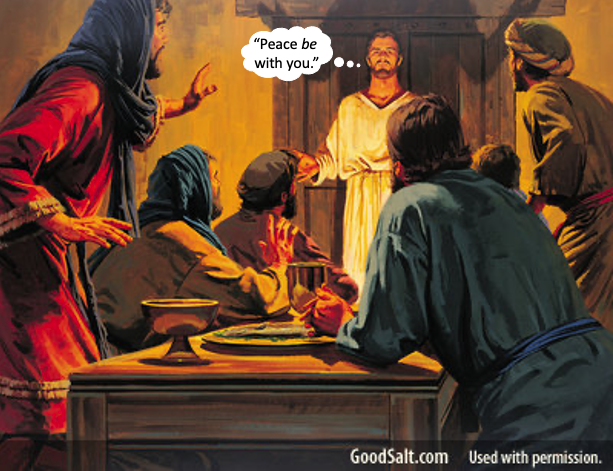“Then, the same day at evening, being the first day of the week, when the doors were shut where the disciples were assembled, for fear of the Jews, Jesus came and stood in the midst, and said to them, ‘Peace be with you.’ ” John 20:19
The right part of the human brain known as the limbic system reacts with survival responses to three areas: food, sex, and safety. One of those survival responses is fear. In the limbic system of the brain, pain results in fear. We may fear abandonment, criticism, disrespect, embarrassment, inadequacy, rejection, shame, and vulnerability. 1
In a world of insecurity and uncertainty, we are going to experience fear. But it is important to understand that whatever we fear, we give power and control to. When we fear the things of this world, including humans, we give authority and control to the god of this world, Satan (John 12:31). 2
Most fear is based upon lies and can give the father of lies (John 8:44) control in our lives. This is why some of the most often used commands in the entire Bible are, “DO NOT BE AFRAID,” “DO NOT FEAR”, “FEAR NOT,” “DO NOT BE TERRIFIED,” “DO NOT TREMBLE.” I counted these commands appearing one hundred forty-four times in the NKJV of the Bible. 3
For the next few days we are going to discover how to overcome our fears by looking at how Jesus enabled His disciples to overcome their fear. The first way to overcome fear in our lives is to RELY ON JESUS TO CALM OUR FEAR WITH HIS PEACE-GIVING PRESENCE (John 20:19). After appearing to Mary Magdalene early on the day of His resurrection, Jesus then appeared to other women (Matthew 28:9-10), to Simon Peter (Luke 24:33-35; I Corinthians 15:5), and to the two disciples on the Emmaus road (Mark 16:12-13; Luke 24:13-32). It was late in the evening of that most memorable day when Jesus appeared to ten of His closest disciples (John 20:19-23).
“Then, the same day at evening, being the first day of the week, when the doors were shut where the disciples were assembled, for fear of the Jews, Jesus came and stood in the midst, and said to them, ‘Peace be with you.’ ”( John 20:19). On one of the greatest days in the history of the world, when Jesus’ Eleven disciples minus Thomas should have been dancing in the streets, they were trembling behind “shut” (kekleismenōn) or “locked” doors. 4 The verb kleiō is in the perfect tense, meaning “the doors” were locked in the past and they remained locked to the present.
Notice also the word “doors” is plural, suggesting that the door into the room and a door into the house entrance were locked. Why? “For fear of the Jews.” It is understandable why the disciples were afraid. The Jews had managed to put Jesus to death and the disciples were His closest companions. A rumor was being spread by the Jewish leaders through the Roman soldiers that Jesus’ disciples had stolen His dead body from the tomb (Matthew 28:11-15). Now that Jesus was removed, the Jews may focus their bitter hatred toward His followers. After all, Christ had warned them of coming persecution (John 15:20; 16:1-2).
The disciples were paralyzed with fear and understandably so. We too can experience paralyzing fear. We are no different than the disciples. We may not share Christ with others because we are afraid of failure, rejection, or what others will think of us. Remember whatever we fear, we give power and control to. When we remain silent in our witness for Christ because of fear, we are giving Satan control over that area of our lives.
While the disciples were hiding in isolation, Jesus suddenly and supernaturally appeared to these ten disciples. Keep in mind that the doors remained shut and locked when “Jesus came and stood in the midst” of them. This phrase can be translated, “Jesus came and stepped into the midst” of them. “Jesus’ resurrection body had passed through grave clothes and a rocky tomb. Now it passed through the walls of this structure.” 5
“Now, clearly, Jesus had a physical body. Mary touched him (20:17); Thomas would touch him (20:27); later he would eat with his disciples (21:12-13). He was no mere phantom (see Luke 24:39). He had risen bodily from the grave. But his resurrected body no longer had material limitations. Apparently, he could pass through locked doors if he wanted. And later he would ascend on a cloud into heaven (see Acts 1:9). The apostles tell us that our resurrection bodies will be like his (see 1 Cor 15:45-57; Phil 3:21; 1 John 3:2).” 6
Even though the disciples took security measures, they could not prevent the appearance of Christ in their midst, for He materialized before their eyes. 7 Likewise, human governments and religions can outlaw Christianity, but all of their security measures cannot keep Jesus from revealing Himself to people in those countries or regions. Jesus still comes “to seek and to save that which was lost” (Luke 19:10).
For example, “For decades, a well-documented phenomenon has been occurring in the Muslim world—men and women who, without knowledge of the gospel, or contact among Christians in their community, have experienced dreams and visions of Jesus Christ. The reports of these supernatural occurrences often come from ‘closed countries’ where there is no preaching of the good news and where converting to Christianity can invoke the death sentence. But these are more than just dreams… A common denominator appears to be that the dreams come to those who are seeking—as best they can—to know and please God.” 8
When Jesus appeared to the disciples, He said to them, “Peace be with you.” (John 20:19b). The Greek word for “peace” (eirḗnē) arises from a life of faith in God. It refers to a calmness “that would come to their hearts from trusting God and from knowing that He was in control of all events that touched their lives.” 9
Before we can possess this kind of peace, we must first receive “peace with God” through faith in Jesus for eternal life (Romans 5:1). Why do we need peace with God?
The Bible tells us, “And you, who once were alienated and enemies in your mind by wicked works, yet now He has reconciled” (Colossians 1:21). Before we become Christians, we are God’senemies. “All we like sheep have gone astray; we have turned, everyone, to his own way; and the Lord has laid on Him the iniquity of us all” (Isaiah 53:6). We need to be reconciled to God because of our sin. God does not need reconciling to us, we need reconciling to God. We turned away from God. He never moved. We moved. The people God created rebelled against their Creator and sinned so that death spread to all people because all sinned (Genesis 3:1-7; cf. Romans 3:23; 5:12-14, 18a).
The Bible tells us, “Having made peace through the blood of His cross” (Colossians 1:20b) means causing God’s former enemies to become His beloved children by faith in Jesus Christ. The Bible says, “Therefore, having been justified by faith, we have peace with God through our Lord Jesus Christ.” (Romans 5:1). Notice that “peace with God” is not through our good life, our prayers, or our religion. Peace with God is “through our Lord Jesus Christ.” The moment we believe in Jesus Christ and His death on the cross for all our sins, we are “justified” or declared totally righteous before God as if we had never sinned.
To be justified before God means to be declared the opposite of what we are. If I was hateful, I am now declared loving. If I was impatient, I am now declared patient. If I was impure, I am now declared pure. If I was selfish, I am now declared selfless.
When you believe in Jesus, He comes to live inside you through His Holy Spirit (John 7:38-39; Romans 8:11; Galatians 2:20). Christ now lives in you and promises never to leave you nor forsake you (Hebrews 13:5). Through His death on the cross, Jesus conquered Satan’s control of death (cf. Hebrews 2:14-15). Satan can no longer use your fear of death to enslave you to his will. Christians can now face death with the same confidence in God the Father that Jesus had (cf. I Peter. 2:21-24). Believers are assured of peace with God forever (Colossians 1:19-21).
Christ’s peace does not mean an absence of pain or conflict in our Christian lives. Jesus Himself was “troubled” (John 12:27) when He looked ahead to His crucifixion. He was “troubled” when He focused on Judas’ betrayal (John 13:21). The peace that Jesus speaks of in John 20:19 refers to a deep-seated calmness that stems from trusting in the Lord and His presence. This peace is not the absence of problems, but the presence of Christ in the midst of those problems. Jesus is aware of our difficulties. He is present with us in our problems. We fear not, because He is with us and He is in charge. People who have discovered this have a quiet peace in their hearts even when things are going wrong.
No matter how troubled your heart is, and some of us may be deeply troubled – Jesus’ peace can calm your heart. Talk to Him. Keep your mind focused on Him. The Bible says of the Lord, “You will keep him in perfect peace, whose mind is stayed on You, because he trusts in You” (Isaiah 26:3). Jesus’ presence brings us peace. In Matthew 28:20, Christ promises, “and lo, I am with you always, even to the end of the age.” Jesus guarantees to be with us always as we make disciples who follow Him. In Philippians 4:6-7, God assures us that as we pray, His peace, “which surpasses all understanding, will guard your hearts and minds through Christ Jesus.” Christ can calm us with His presence and His peace just as He did for His disciples.
Prayer: Lord Jesus, for so much of my life I lived in fear behind the locked doors of my broken heart. I was afraid if people really knew me, they could not possibly love me. But the day came when You revealed Yourself to me behind my walls of protection. Your love dispelled the darkness of sin and shame in the depths of my soul. When You invited me to believe in You for Your unlimited forgiveness and everlasting life, I quickly responded in faith and You freely forgave all my sins and gave me everlasting life. You took up residence in my body through Your Spirit. And You kept Your promise to never leave me nor forsake me since that time. Your presence continues to calm my fears and give me Your peace. I pray You will continue to reveal Yourself to others as the Prince of Peace. Please use me as You deem best to share Your peace with those You place in my life. In Your peace-giving name I pray. Amen.
ENDNOTES:
1. Michael Dye, The Genesis Process (Michael Dye, 2012), pp. 45-46.
2. Ibid., pp. 95-96.
3. See Genesis 15:1; 21:17; 26:24; 35:17; 43:23; 46:3; 50:19, 21; Exodus 14:13; 20:20; Numbers 14:9; 21:34; Deuteronomy 1:17, 21, 29(2); 3:2, 22; 7:18, 21; 18:22; 20:1, 3(4); 31:6(2), 8; Joshua 1:9; 8:1; 10:8, 25; 11:6; Judges 4:18; 6:10, 23; Ruth 3:11; I Samuel 4:20; 12:20; 22:23; 23:17; 28:13; 2 Samuel 9:7; 13:28; I Kings 17:13; 2 Kings 1:15; 6:16; 17:25, 35, 37, 38; 19:6; 25:24; I Chronicles 22:13; 28:20; 2 Chronicles 20:15, 17; 32:7; Nehemiah 4:14; Job 5:21, 22; 11:15; Psalm 23:4; 27:3; 46:2; 49:16; 56:4; 64:4; 91:5; Proverbs 3:24, 25; Isaiah 7:4; 8:12; 10:24; 12:2; 35:4; 37:6; 40:9; 41:10, 13, 14; 43:1, 5; 44:2, 8(2); 51:7(2); 54:4, 14; Jeremiah 1:8; 10:5; 23:4; 30:10; 40:9; 42:11(2); 46:27, 28; Lamentations 3:57; Ezekiel 2:6(3); 3:9; Daniel 10:12, 19; Joel 2:21, 22; Zephaniah 3:16; Haggai 2:5; Zechariah 8:13, 15; Matthew 1:20; 10:26, 28, 31; 14:27; 17:7; 28:5, 10; Mark 5:36; 6:50; Luke 1:13, 30; 2:10; 5:10; 8:50; 12:4, 7, 32; 21:9; John 6:20; 12:15; 14:27; Acts 18:9; 27:24; I Peter 3:6, 14; Revelation 1:17; 2:10.
4. Walter Bauer, A Greek-English Lexicon of the New Testament and Other Early Christian Literature: Third Edition (BDAG) revised and edited by Frederick William Danker (Chicago: University of Chicago Press, 2000 Kindle Edition), pg. 547; J. Carl Laney, Moody Gospel John Commentary (Chicago: Moody Press, 1992), pg. 365.
5. Tom Constable, Notes on John, 2017 Edition, pg. 375.
6. Tony Evans, CSB Bibles by Holman. The Tony Evans Bible Commentary (B & H Publishing Group, Kindle Edition, 2019), pg. 1828.
7. J. Dwight Pentecost, The Words & Works of Jesus Christ, (Grand Rapids: Zondervan, 1981), pp. 504-505.
8. Retrieved on May 21, 2021 from https://lausanneworldpulse.com/perspectives-php/595/01-2007.
9. Pentecost, pg. 440.











